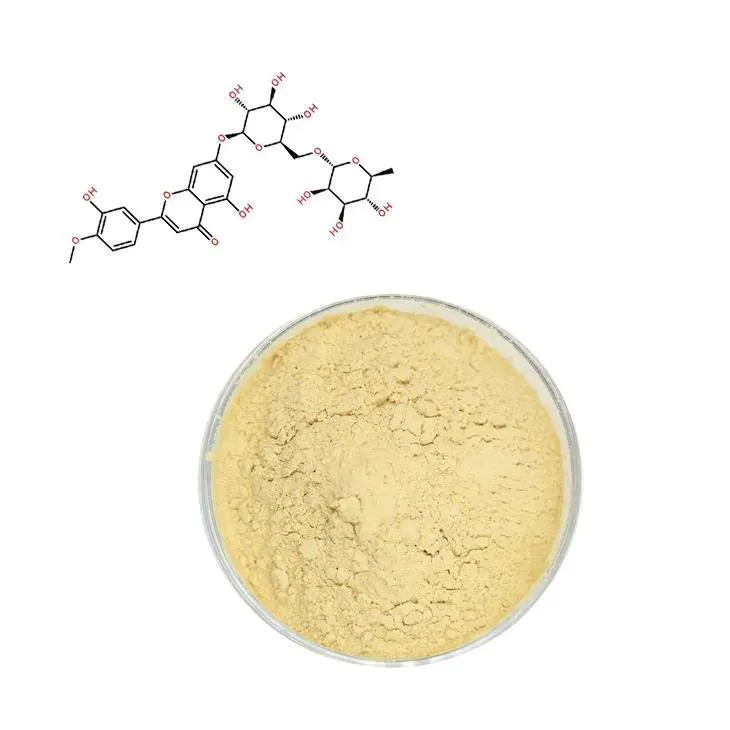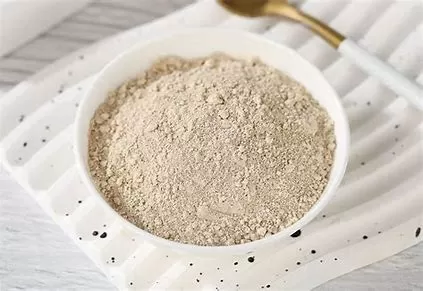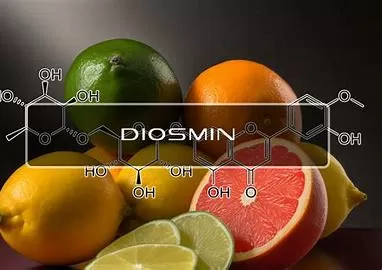- 0086-571-85302990
- sales@greenskybio.com
what is the mechanism of action of diosmin
2025-03-23

Diosmin is a naturally occurring flavonoid found in citrus fruits, recognized for its extensive therapeutic applications, particularly in the treatment of venous disorders. Its efficacy as a phlebotropic agent has been documented in numerous studies, highlighting its role in improving venous tone, lymphatic drainage, and overall microcirculatory health. The unique mechanism of action of Diosmin offers significant insights into its diverse pharmacological effects, which are pivotal in its widespread use in clinical settings. This article delves into the intricate mechanisms underlying Diosmin's therapeutic effects and explores its potential applications in the medical field.
Chemical Nature and Pharmacokinetics
Diosmin belongs to the flavonoid family, characterized by a polyphenolic structure that contributes to its biological activity. It is predominantly sourced from citrus fruits and is often used in micronized purified flavonoid fraction (MPFF) formulations to enhance its bioavailability. The micronization process improves diosmin's absorption and efficacy by increasing its solubility, which is otherwise low in its natural form.
Upon oral administration, diosmin undergoes intestinal absorption and metabolism, primarily in the liver, where it is converted into its active metabolites, including diosmetin. The metabolic transformation is crucial for its pharmacological activity, facilitating its interaction with various biological pathways. The elimination of diosmin is primarily renal, with the majority excreted as glucuronide conjugates.

Mechanism of Action
1. Venous Tone and Circulatory Enhancements
Diosmin exerts a significant phlebotropic effect by modulating venous tone, which is essential for treating chronic venous insufficiency (CVI) and related disorders. It enhances the contractility of the vein walls by increasing norepinephrine activity in the venous system, leading to vasoconstriction and improved venous return. This action mitigates symptoms such as leg swelling, pain, and heaviness, common in CVI patients.
Furthermore, diosmin improves microcirculatory dynamics by reducing capillary permeability and fragility. It stabilizes endothelial cells, preventing the leakage of fluid into the interstitial spaces, thereby addressing edema formation. This reduction in capillary hyperpermeability also contributes to the anti-inflammatory effects observed in diosmin therapy.
2. Anti-inflammatory and Antioxidant Properties
Diosmin exhibits potent anti-inflammatory effects by inhibiting key inflammatory mediators. It suppresses the expression of cyclooxygenase (COX) enzymes, particularly COX-2, and subsequent prostaglandin synthesis, crucial in the inflammatory response. Additionally, diosmin modulates the activity of nuclear factor-kappa B (NF-kB), a transcription factor pivotal in inflammatory pathways, leading to a decrease in cytokine production.
The antioxidant capacity of diosmin further complements its therapeutic profile. It scavenges free radicals and reactive oxygen species (ROS), thereby protecting cellular components from oxidative damage. This antioxidant action is particularly beneficial in preventing complications associated with chronic inflammation and oxidative stress, such as atherosclerosis and tissue degeneration.
3. Lymphatic Effects and Tissue Protection
Diosmin's role in enhancing lymphatic drainage is vital for managing conditions associated with lymphatic congestion and lymphedema. By promoting lymphatic contractility, diosmin facilitates the removal of excess interstitial fluid and metabolic waste products, supporting tissue homeostasis and reducing swelling.
Diosmin also demonstrates protective effects on the cardiovascular system, helping maintain endothelial function and vascular integrity. Its ability to modulate nitric oxide (NO) pathways enhances vasodilation and improves blood flow, offering protection against hypertension and ischemic conditions.
Clinical Applications and Benefits
Diosmin's multifaceted mechanisms translate into diverse clinical applications, predominantly focusing on venous disorders. It is extensively prescribed for treating CVI, hemorrhoids, varicose veins, and venous ulcers, owing to its ability to improve venous tone and reduce inflammation. Patients with diabetes and related microvascular complications also benefit from diosmin's endothelial protection and microcirculatory enhancements.
Recent studies have explored diosmin's potential in oncology, given its anti-inflammatory and antioxidant properties, which can complement cancer therapies. Its potential role in protecting against radiation-induced damage and enhancing the efficacy of chemotherapeutic agents is an area of active research.
Safety Profile and Considerations
Diosmin is generally well-tolerated, with minimal side effects such as gastrointestinal discomfort, headaches, and skin reactions. Its safety profile makes it suitable for long-term use, especially in chronic conditions like CVI. However, it is crucial to consider potential interactions with other medications and consult healthcare professionals before integrating diosmin into therapeutic regimens.
Conclusion
Diosmin stands out as a versatile flavonoid with significant therapeutic potential due to its complex mechanism of action encompassing venous enhancement, anti-inflammatory, antioxidant, and lymphatic effects. Its successful application in managing venous disorders highlights the importance of understanding its pharmacodynamic properties and leveraging its benefits in clinical practice. Continued research into diosmin's additional applications and synergy with other treatments promises to expand its role in medicine, offering improved outcomes for patients across various conditions.
- ▶ Hesperidin
- ▶ citrus bioflavonoids
- ▶ plant extract
- ▶ lycopene
- ▶ Diosmin
- ▶ Grape seed extract
- ▶ Sea buckthorn Juice Powder
- ▶ Beetroot powder
- ▶ Hops Extract
- ▶ Artichoke Extract
- ▶ Reishi mushroom extract
- ▶ Astaxanthin
- ▶ Green Tea Extract
- ▶ Curcumin Extract
- ▶ Horse Chestnut Extract
- ▶ Other Problems
- ▶ Boswellia Serrata Extract
- ▶ Resveratrol Extract
- ▶ Marigold Extract
- ▶ Grape Leaf Extract
- ▶ blog3
- ▶ blog4
- ▶ blog5
-
what is diosmin hesperidin daflon
2025-03-23
-
what is micronized diosmin
2025-03-23
-
what are the contraindications for diosmin
2025-03-23
-
Almond Extract Powder
2025-03-23
-
Grape Leaf Extract
2025-03-23
-
Konjac Powder
2025-03-23
-
Okra Extract
2025-03-23
-
Saffron Extract Powder
2025-03-23
-
Red Wine Extract
2025-03-23
-
Longan Extract
2025-03-23
-
Andrographis Paniculata Extract Powder
2025-03-23
-
Peppermint Oil
2025-03-23
-
Tamarind extract powder
2025-03-23





























